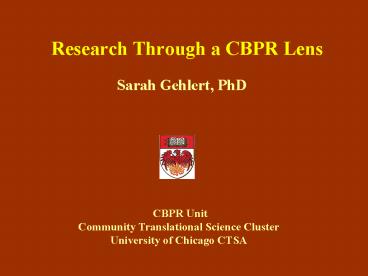Research Through a CBPR Lens - PowerPoint PPT Presentation
1 / 20
Title:
Research Through a CBPR Lens
Description:
Any research conducted in a community setting. can represent a range of involvement of community members in the research ... Winkler and Wallerstein, 2003. CBPR ... – PowerPoint PPT presentation
Number of Views:55
Avg rating:3.0/5.0
Title: Research Through a CBPR Lens
1
Research Through a CBPR Lens
- Sarah Gehlert, PhD
CBPR Unit Community Translational Science
Cluster University of Chicago CTSA
2
Community-Based Research
- Any research conducted in a community setting.
- can represent a range of involvement of community
members in the research process - be funded any mechanism (R01, R03, R21, K, etc.)
- be reviewed by any institute or center at NIH
3
Community-Based Participatory Research (CBPR)
- A special category of community-based research
with certain expectations
4
Definition of Community-Based Participatory
Research (CBPR)
- Collaborative approach to research that
equitably involves all partners in the research
process and recognizes the unique strengths that
each brings. CBPR begins with a research topic of
importance to the community with the aim of
combining knowledge and action for social change
to improve community health and eliminate health
disparities.
W.K. Kellogg Community Scholars Program (2001)
5
Why is this distinction important?
6
Four Ps of 21st Century Medical Research
- Predictive
- Personalized
- Preemptive
- Participatory
Elias Zerhouni
7
Community Participation Valued by NIH
- special review
- CBPR proposals can be submitted to institutes
and centers, but reviewed by special cross-NIH
panels (need for special expertise) - special funds have been set aside for CBPR
8
What is CBPR?
- .not a research method itself, or a theory,
but an orientation to research - Can be
- qualitative
- quantitative
- mixed methods
- randomized clinical trial
- etc.
9
CBPR In the Terms of Translational Research
- Translational Blocks
T1
T2
Transfer of new understandings of disease
mechanisms gained in the lab into the
development of new methods for diagnosis,
treatment, and prevention and their first testing
in humans
Translation of results from clinical studies
into everyday clinical practice and health
decision making
CBPR
Source Woolf, JAMA, 2008
10
CBPR
- represents a balance between research and
community empowerment - in its ideal form, represents an equal
partnership between academics and community
members at all stages of the research process
11
CBPR
- relies on trust, cooperation, dialogue,
community capacity building, and collaborative
inquiry toward its goal of improving health and
well-being - Winkler and
Wallerstein, 2003
12
CBPR
- engages community members and researchers as
co-equal partners - is an alternative to outside expert-approaches
to research, which have produced interventions
with mixed effectiveness - working with community members, heightens the
effectiveness and sustainability of practices,
program, and policies derived from research
results
13
The Research Process Through Two Lens
Community
Researchers
with community partners as co-authors
14
- The Ideal is Achieved when Community and
Academic Perspectives are Balanced at Each Stage
of the Research Process
academic rigor
community reality
gives faith that findings will translate into
real world outcomes
gives faith that findings are real
15
CBPR Proposals Fail to Survive the Review Process
Because
community partnerships are strong, but not
written about systematically and scientifically
strong scientific projects, but fail to
demonstrate true co-equal partnerships throughout
the research process
16
Challenge to Academics
- Community ideas about research design and
sampling may challenge academics conceptions of
is good science - adds concerns about the usefulness and
suitability of topic selection - without lessening adherence to scientific rigor,
academics can broaden their bandwidth
Reason Bradbury, 2001
17
Challenges of CBPR
- For communities
- to contribute knowledge and experience while
safeguarding community interests - For academic researchers
- to establish real partnerships
- to balance excellent science with humility,
compassion, and respect
18
Challenges of CBPR I
- Should be community-based
- not merely community-placed
The ideal may be when ideas originate in the
community and academic partners are brought on
board to establish research methods and evaluate
success.
19
Challenges of CBPR I
- But many projects would not occur absent the
initiative of an academic researcher - project should be high on the agenda of the
community - researcher must have good interpersonal skills
and knowledge of group dynamics to - ensure a co-equal partnership
- eventually shift control to the community
20
Challenges of CBPR II
- Sharing findings influencing policy practice
- might less favorable findings harm the community?
- what should be published and where?
- who decides if and what findings are published?
Document understandings early in the process.
Decide in advance how disagreements will be
handled.































